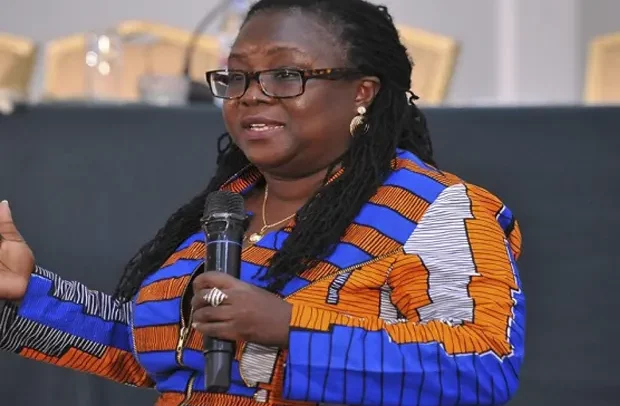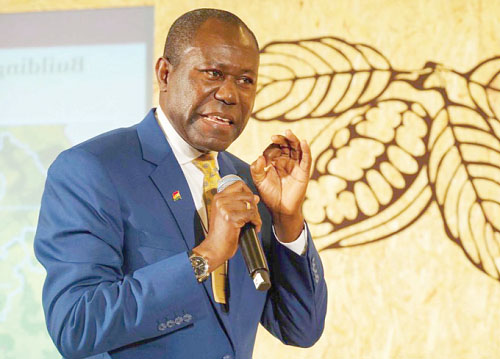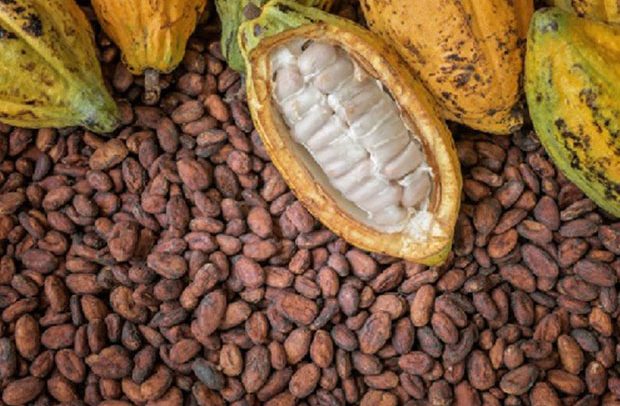
By Juliet ETEFE ([email protected])
Cocoa farmers in the Assin area of Central Region have shared mixed reactions following government’s announcement of a new producer price of GH¢3,228.75 per 64kg bag of cocoa for the 2025/2026 crop season.
While some farmers have welcomed the increase and accompanying support measures, others say the rise from GH¢3,100 per bag does not reflect the true effort of cocoa production in the country.
The new price, which represents US$5,040 per tonne, was announced by Minister for Finance Dr. Cassiel Ato Forson on August 4, 2025 and will take effect on August 7. It represents 70% of the gross Free-On-Board (FOB) value of US$7,200 per tonne and marks a 62.58% increase from last season’s dollar-denominated price of US$3,100.
Beyond pricing, government plans to roll out a series of policy and operational changes at the Ghana Cocoa Board (COCOBOD) which oversees the sector. These include reintroduction of free fertiliser, insecticides, spraying machines and fungicides from the 2025/26 season onward. COCOBOD will also launch a Tertiary Education Scholarship Scheme for children of cocoa farmers, with implementation due to begin in the 2026/27 academic year.
Support for the move
Samuel Torbi, a former Assin North Municipal best cocoa farmer with 36 acres of farmland, said he was not surprised by the new price, stating that it reflects government’s earlier commitment to offer 70 percent of the FOB price to farmers.
“We follow the world market price, so when we saw the update we were not surprised. We are happy with the price. President Mahama has used strategies to help us – free fertiliser, chemicals, machines and even scholarships for our children. It is a lot of money,” he told Business and Financial Times.
Politics
Mr. Torbi further cautioned against politicising the cocoa sector, noting that successive governments often alter productive programmes to suit their political agendas.
“Our major problem is using cocoa to do politics. People who know the work are often removed when power changes. That affects us,” he said, adding that the sector is key to the economy and must be prioritised.
Madam Comfort Larbi, also a cocoa farmer at Assin Fosu with a three-acre farm, said although she was expecting a higher increase the current price is acceptable.
“We heard the price would go up and thought it would be higher. But it is okay for now – we hope it continues to increase as time goes on,” she noted.
Madam Larbi, who has been cultivating cocoa for the past 10 years, lauded government’s scholarship scheme for cocoa farmers’ children – hoping her 14-year-old firstborn daughter, currently in Junior High School Form 3, will one day be a beneficiary. She also called on authorities to urgently address poor road conditions leading to cocoa-growing areas, especially the cocoa station roads. In addition, she appealed for improved technical assistance and better telecommunication network access, as connectivity in farming communities remains a challenge.
However, not all farmers are satisfied with the announced price. Joseph Adjalo, a cocoa farmer from Assin Foso, described the increment as not what they were expecting. He said he was expecting at least GH¢4,000 per bag, citing demanding nature of the work and cost of inputs.
“To move from GH¢3,100 to GH¢3,228.75 is small. We expected more,” he said.
Mr. Adjalo also raised concerns about the scholarship scheme introduced for children of cocoa farmers, urging government and COCOBOD to ensure transparency in the selection process.
“They should make sure the scholarships go to the right people,” he said.
Similar sentiments were shared by Mr. Joseph Mensah, a farmer managing 15–16 acres who simply said “This is not what we were expecting”.
Contrary
Meanwhile, the Ghana Cocoa, Coffee and Sheanut Farmers Association (COCOSHE) has welcomed the new cocoa price, describing it as a step in the right direction. During a press briefing in Accra, COCOSHE praised government and COCOBOD for maintaining the previous price despite a strong cedi and commended the new establishment3,228.75 per bag rate as a fair reflection of farmers’ contribution to the economy.
They further called for timely distribution of inputs and sustained investment in extension services and traceability systems to ensure long-term sector growth.
On the other hand, the Côte d’Ivoire-Ghana Cocoa Initiative (CIGCI) congratulated Ghana’s government on the official opening of its 2025/2026 cocoa season and announcement of a new producer price that reflects a sustained commitment to the welfare of cocoa farmers.
The finance minister also noted while announcing the price that: “In recent months, the US dollar has significantly depreciated against the Ghanaian cedi. We fully acknowledge that based on prevailing exchange rate trends it would have been justifiable for cocoa prices to be reduced significantly, as is often the case in other cocoa-producing countries.
“In spite of this, government and the Ghana Cocoa Board (COCOBOD) took decisive steps to cushion the impact on cocoa farmers by maintaining producer price at GH¢3,100 to end the 2024/2025 cocoa season. This reaffirms the commitment of Government and COCOBOD to the welfare of cocoa farmers by maintaining the producer price at GH¢49,600 per tonne, equivalent to GH¢3,100 per 64kg bag”.
Global developments
Globally, cocoa prices reached historic highs in early 2025 – with futures peaking above US$11,000 per tonne in both London and New York for January amid widespread crop failures in Ghana and Côte d’Ivoire, which account for more than 60 percent of global supply.
As of the beginning of August 2025, spot prices have eased to around US$8,100–8,300 per tonne, still far above historical norms.
According to the International Cocoa Organisation (ICCO), the 2024/25 crop year experienced one of the largest global deficits in over two decades – driving sustained price pressure despite recent production gains.
The post Mixed reactions greet new cocoa price appeared first on The Business & Financial Times.
Read Full Story























Facebook
Twitter
Pinterest
Instagram
Google+
YouTube
LinkedIn
RSS